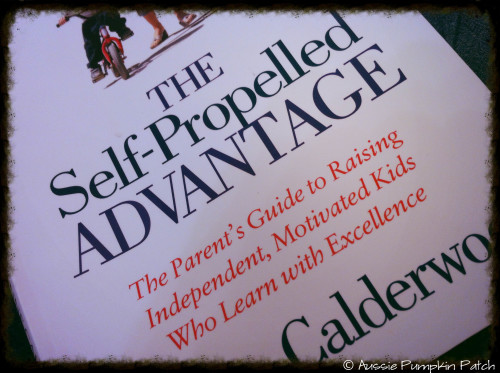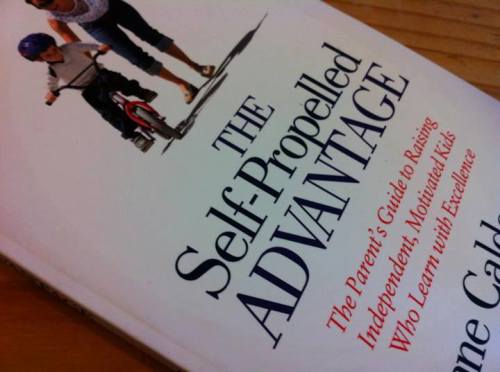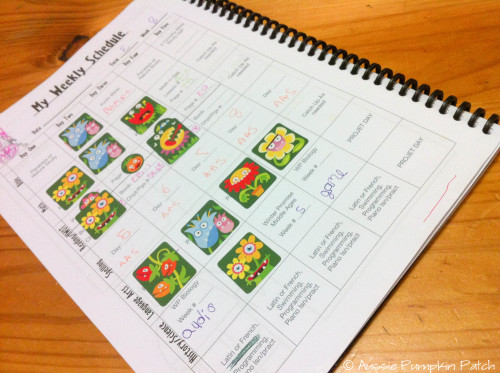
When it arrived I curled up, of all places, in our tent and read for hours. We were suppose to be camping down the East Coast when our youngest was diagnosed with a nifty case of bronchitis. He was struggling to keep the medication for it down, so we camped {during the day anyway} in the front yard. It made for a lovely warm and cozy place to read the book!
We implemented a few of the ideas in the book. Then, before we knew it, Nana had fallen and broken her hip, we were packing up for a move and then summer was upon us. They say that time flies when you are having fun, but truthfully time flies even faster when you have seem to have so little of it.
This year, finally settled in our new home, and back into a normal daily routine I was reminded of the book. I noticed that we hadn’t continued our forward progress as intended. I enlisted the help of the same friend {Thanks Pam!} who’d first introduced the book to me and reread the book discussing, with her, each chapter as we went along.
It was a refreshing time where I could really focus on each individual chapter and how I could apply aspects of it to our family. I struggled a bit with at least one chapter, but knowing that I needed to be ready to discuss the chapter at the end of the week helped keep me on target.
Now, some 10 weeks after being back into the swing of things and really digging in with the methods mentioned in the book I thought I’d share a bit about the book here. The premise behind the book is that as soon as your child is capable of reading instructions on a math worksheet you start guiding them to taking control of their own education. This goes beyond owning a project or having a passion for a particular subject.
We’re talking scheduling out their days/weeks, correcting their work, and to most extents being their own personalized tutor. Of course, at a young age a child needs much guidance, overseeing, and encouraging along this path. The author, herself, stumbled upon this idea all most on accident as she was struggling with a pregnancy that had her knocked out flat, yet still had children that needed to accomplish their studies.
How I use it:
In our home, our boys are responsible for filling out their own planners for the week ahead. At the end of each week they verify what they’ve done and discuss with me how things went, all though I’m pretty aware based on keeping up with the daily. I allow them to discuss whatever is on their minds, hearts and shoulders.
Were they struggling with a math lesson this week? Why? How can we fix that? Often times, my children cut themselves short and don’t offer themselves enough slack. Plus, generally when they present their struggle or situation with me it takes a little bit of encouragement for them to see how wonderful they really did. Then they map out their course for the next week.
It really is that simplistic in our home, although there are a few more nitty gritty bits to mention. My children are not free to simply plan only to do math in any given week. Rather, they are responsible for knowing what their workload for a term/year is and scheduling it out in order to meet goals.
What are these goals? They differ per student and are based on the curriculum we use and the personal needs and interests of each student. In a more simplistic explanation if my child is using a math book with say 30 lessons of math in it, his goal for a term would be to complete 7-8 lessons. Completing more means they exceeded their goal, completing less requires us to look hard at where things went awry.
My children do not do all their work on their own. For instance, we still do read alouds and a few other things together as a family. For those particular items we have a specific time in which we meet together to get things done. The rest of the day is up to the kids in how they divide their time in order to accomplish the lessons in their planner.
We still have guidelines for finishing up. Any child who has not finished their work by 4:30 pm is not permitted electronic time in our home. We’re not big on lots of electronic times during the school week, but it is a big deal for my boys to have a race or two on the Wii with Dad before bedtime.
I am always available to help them if they get stuck. It may be as simple as me saying, “Did you flip back to that previous lesson to review what you did? I think you might find it helpful!” or “Check the science shelf in the library, we have a book on that.” or, “Feel free to Google it, and if you need help spelling it out let me know.”
What I love about it:
My children have shown they are more then capable of accomplishing the tasks set before them. I think deep down most of us know this is possible with our children, but it doesn’t stop us from worrying about it. My children have proven to themselves and their parents that they can and will if simply given the time and space.
I love that my children are learning so self regulate their time. As an example, both were enjoying watching a short programme before they began their school work, but once we put this method into effect I would not give or deny permission. I told them they had to decide for themselves if they had enough time in their day. Interestingly enough they were worried about making the choice on their own and opted once to watch a double episode. They quickly learned that it wasn’t the wisest choice and that limiting themselves to one, or even saving that one little thing until they were finished was a wiser choice. I applauded their choices, but never once attempted to interfere with their plans.
I love that not only are my children learning, but they are enjoying do so. I won’t say that they both love every subject and are jumping up and down for joy to get to it, but they are aware of the requirements and they cherish the freedom of choosing what they do when enough that I don’t hear complaints or have to argue to get the work done. They simply do the work they’ve set for themselves.
Setting goals has really helped keep my children on track. We tend to school in 10 week terms, with four of those each year. We rarely take more then day here or there off during a term. It’s not that we are task driven, but rather that once we are in a routine we stick with it. My youngest, 11, was really feeling the weight of this particular term and was so ready for his break that he asked if he could just call it quits and make up the remainder of his math next term. Instead of declaring that completely unacceptable, we opened up his planner and looked at his goals. He was so close to each one it was enough to encourage him to follow it through and finish off the term. We’ll have a week off in the middle of next term, he’s delighted.
I love that my children are aware that their opinions and needs are very much a part of this learning process. While I’m all for getting in and getting it done my children might have other opinions. Our eldest didn’t feel ready to progress in math one week, I disagreed, but I left him to his own devices, which wasn’t easy for me. He wanted to better grasp the Greek terms he was learning and in the end he was really grateful he stayed put because he didn’t feel overwhelmed when he did the work that week. Again, we backed up his choice and then applauded him for staying firm in his choices and being honest about his abilities.
I love the sense of accomplishment my children feel. At the end of this past term my children opened up their planners to the goals that they had set. They marked off the ones that were accomplished. Both were so pleased to see that nearly every single goal was met, a few were surpassed, and one was lacking. I was aware of the lacking goal and it was within reason so there were no consequences other then our own semi-disappointment.
What I don’t Love:
When it comes to this method I don’t think there is anything not to love. It’s difficult for a parent who’s been actively involved in every aspect of their child’s life to start walking away. This was the hardest part of this method for our family. I found that, in order to be out of the way, I had to find intentional things to keep me busy. I’ve taken up French 1 & decided to brush up on pre-algebra just in case the eldest should get stuck.
At the same time the author is very passionate about her method and how it worked for her family. She covers a lot of basics in the book and points that one of the number one building blocks to making this work successfully is being sure our children’s hearts are where they should be. I don’t disagree with that statement, but I also think that if you are parenting a Strong-Willed Child {SWC} you may discover that it’s not as cut and dry as the author makes it out to be in that chapter in the book. In fact, it was the most difficult chapter in the entire book for me because I am the parent of an amazing, funny, crazy, curious, and creative SWC. I won’t discuss a SWC in depth here, but suffice it to say I wonder if the author’s view on that chapter would have been different had she parented one.
The author also discusses leaving your student for an entire semester, once they are at a high school level, before checking in on their progress. I don’t think I’m that hands off. She does discuss checking in daily with math scores and asking if they are on target, etc. For our family, at least at this stage, I’m not keen on the idea of going an entire 10 weeks without peeking in on what my kids are doing. {Keep in mind that a high schooler for this author is Grade 9, not Grade 7 for any Aussies out there reading this…}
The author has the children correct their own work. This is possible because in order for this method to work you must have a certain amount of trust between yourself and your children. Here’s the thing, I have a child who doesn’t want to correct his work. This is not an attitude issue, this is not a heart issue, and this is not an SWC issue. This is a personal choice he’s had his entire life. He does not like to look at the answers in any given situation for fear that the answers he sees will stick with him when he attempts the next lesson. I don’t think that’s truly possible, but for now I respect his choice and we correct his work together.
Bottom Line:
After giving my children 10+ weeks of using this method they’d never want to go back to Mom delegating everything. They are first to mention they need to get started on school, and first to bring accomplished work to me. They’ve shown that, despite what fears I may have had, they are absolutely capable of meeting the challenges set before them!
You can find Self Propelled Advantage via the author’s website.
—-
To read more about implementing the Self Propelled Advantage, Check out the kids Lego Planners, or to hear more about the book itself, hop on over to Kendra’s blog at: blog.aussiepumpkinpatch.com





Kendra, Thank you for bringing this book to my attention! In our homeschool one of the things we emphasize is independent learning. Because with a 5 to 1 ratio I’d kill myself trying to teach every class. Our homeschool distinctives have freed me to be a better tutor and Mom. Thanks for bringing this book to my attention! Kyle